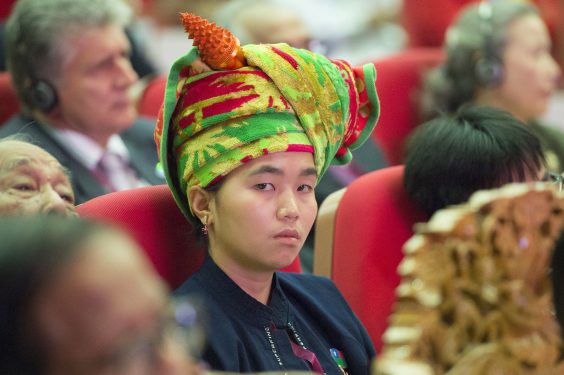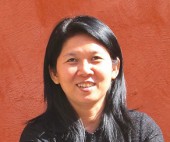Are People Living in the State of Confusion?
by Ma Thida / September 30, 2016 / No comments

Participants at the 21st Century Panglong Peace Conference in Nay Pyi Taw, Myanmar. Image Credit: via Flickr user United Nations Photo
The 2016 Panglong Peace Conference – aimed at envisioning federalism for Myanmar –occurs in Nay Pyi Taw under the shadow of widespread ethnic conflict.
Soon after the 21st Century Panglong Peace Conference was finished, the Myanmar Border Guard Forces and the state army had a conflict with the Democractic Karen Buddhist Army (DKBA) that caused around 3,400 people in Mae Tha Waw village, Kayin State to become internally displaced persons on September 11, 2016. In fact, there was such a huge event in Nay Pyi Daw from August 31 until September 3, 72 speeches had been made during this event, so some ethnic minority leaders said that it sounded like a presentation event, not a conference. The five groups presented their own agenda; government, state army, ethnic armed organizations, ethnic minorities, and political parties. The most popular topics among these speeches were security and defense (more than 60 percent) and decentralized administration (nearly 50 percent). Though the conference’s aim was pretty clearly stated as to envision federalism for the country, speeches that talked about federalism and federal parliament system were around one fourth of all speeches. On the other hand, armed conflict fire in Kachin, Shan, Mon, and Kayin state had been reintroduced in these days. Where are we heading? What are we looking for? Why are we still fighting with or without arms? I feel I am in a state of confusion.

- Literature is an echoing voice of people’s thought. Along with its people, Burma’s literature and media have suffered greatly during five decades of censorship. The majority of Burma’s population are voiceless, and many untold stories are yet to be discovered by local or international writers and journalists. Here, let’s try to find out and listen to what problems people are feeling, thinking, and facing regarding freedom of expression in their everyday lives in Burma.

- Ma Thida is a Burmese human rights activist, writer, medical doctor, and former prisoner of consciousness. In 1993, she was sentenced to twenty years in Burma’s Insein Prison for actively supporting the Nobel laureate Aung San Suu Kyi. She served six years of her sentence, largely in solitary confinement, and was released through the efforts of Amnesty International and PEN International. She has published nine books in Burmese and English, including The Sunflower (1999), The Roadmap (2011), and Sanchaung, Insein, Harvard (2012), a memoir. Ma Thida is currently president of PEN Myanmar.
After the historic election in November 2015, people are enjoying the result of it with pretty high expectations. People were proud of themselves for knocking out the long-lasting political party, backed by the state army only through their votes. They were asked not to show their pleasant joys because it can possibly ignite the shameful wrath of defeated ones at the election by National League for Democracy (NLD) leader Daw Aung San Suu Kyi. People silently celebrated their success in response to her request. They were waiting for the day when they could joyfully see and feel the sense of changing atmosphere. However, new cabinet members were announced and more than 50 percent, including the president, were not elected ones. People still tried to believe that their votes and mandate could do something new to either administration or parliament. They voted most members of parliaments because they knew those MPs were very good civil society leaders and their interest in changing society was ever high. However, those MPs were asked not to take part in activities of civil society organizations (CSOs).
People still keep their high expectations and rely only on their strong belief in Daw Aung San Suu Kyi. They wonder how MPs from NLD who are majority at nearly every parliament, either union or regional, could raise some critical issues like anti-corruption, educational reform, and right to information effectively and strongly. However, a rumor said that MPs from the NLD were asked not to raise any issues that could be either a headache to the union cabinet or a pain to the state army. In fact, union parliaments are working on reviewing many existing laws in order to be in line with international standard, but the information was not reported well enough either in state or in private mainstream media. Once, editors from state media told The Wall Street Journal that they still need to submit pages of daily newspapers to the minister for scrutinizing. People noticed that the only change in state media is from unreadable propaganda to readable propaganda. Even for the 21st Century Panglong Peace Conference, state media did not provide enough information about its vision – only about its celebration. On the other hand, private media are also covering just a superficial account of its celebration. Getting to have information from either the government (cabinet), the parliament, or even NLD is as hard as from the state army. And any criticism towards ruling government – especially the state counsellor Daw Aung San Suu Kyi – can be counted as bad manner. Pro-NLD or pro-her lobbyists are active mainly on the social media platform Facebook to make bad impressions and terrible comments on any post or news or articles that point out the weakness of herself or her cabinet. So private media are now carefully shaping their news and many political critics had been kept silent for a while. In fact, media is now more like in a state of confusion. It seems like many media do not know how to keep their editorial or academic freedom in order to fulfill the right to know of the people. They really do not want to be recognized as anti-government media.
Therefore, as soon as Panglong Conference was finished, there was no more news coverage on peace process – even the armed conflict in Kayin State was published in very few media. Ceremonial coverage was the only media coverage, and people were hardly informed about the visions of those different groups. Since most speeches at the conference were more focused on the suffering of individual ethnic groups in the past and present, it sounds like no one truly wonders how we could build our nation as a democratic federal nation. When they talk about federalism, they focus more on structure, like power-sharing and resource-sharing, plus division of states. But the most important essence of federalism, like democratic principle and fulfilling basic human rights, was mostly untouched. One of the speeches even suggested to change the name of the country, but there was no proposal how it should be changed.
Since 2012, the peace process has been managed on the basis of direct negotiation and its key player was recently changed after the 2015 election. This process sounds more and more complicated. As a mediator was not allowed in this process, all negotiators keep their own dream as the key agenda in this process, so the final conference was run just as a presentation of their dreams. The good thing about this presentation was that all of those speeches/presentations were broadcasted publicly. Therefore, people were at least happy to learn which group thinks what about the country, though there was no discussion among all those negotiators. However, people need to be encouraged to have a clear vision towards the future. What kind of federal nation are we going to build and how? To answer these questions, people should be informed well and media should also be helpful in interpreting anything happenings in the country. Now people still wonder how they can be either informed or interpreted well enough what is going on and what and how should we dream. Otherwise, people are living in a state of confusion.




